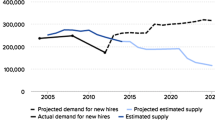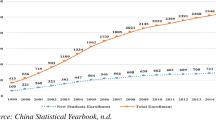Abstract
Japanese schools have a mechanism for helping their students to find jobs, rather than leaving this function to market forces. The system embodies three principles. First, it tries to ensure that every graduating student within a school obtains a job. Second, it gives special assistance to students who are seen as "vulnerable" in the job market. Third, it takes into account individual merit (i.e. academic marks, school attendance and extra-curricular activities). The system recognises that a young person's initial full-time employment is crucial in obtaining an adult identity; that high school graduates are still immature and vulnerable, needing professional adult assistance to find "suitable" employment, and that they have unequal access to such assistance in their families. A key role is played by the teachers, who strive to obtain what they consider to be the most suitable employment for all their graduating students.
Similar content being viewed by others
References
Blackstone, Tessa. 1985. Preface. In: Judith Whyte, Rosemary Deem, Lesley Kant and Maureen Cruickshank, eds., Girl-friendly Schooling (xii–xv). London: Methuen.
Cockburn, Cynthia. 1987. Two-track Training: Sex Inequalities and the YTS. London: Macmillan.
Connell, Robert W. 1993. Schools and Social Justice. Philadelphia: Temple University Press.
Cook, Karen S. and Hegtvedt, Karen A. 1983. Distributive Justice, Equity, and Equality. Annual Review of Sociology 9: 217–241.
Corson, David. 1985. Education for Work: Reflections Towards a Theory of Vocational Education. International Review of Education 31: 283–302.
Corson, David. 1993. Language, Minority Education and Gender: Linking Social Justice and Power. Clevedon, Avon and Philadelphia: Multilingual Matters.
Dale, Roger. 1985. The Background and Inception of the Technical and Vocational Education Initiative. In: Roger Dale, ed., Education, Training and Employment (41–56). Oxford: Pergamon Press.
Dale, Roger, Bowe, Richard, Harris, David, Loveys, Mark, Moore, Rob, Shilling, Chris, Sikes, Pat, Trevitt John and Valsecchi, Vicki. 1990. The TVEI Story: Policy, Practice and Preparation for the Work Force. Milton Keynes: Open University Press.
Deutsch, Morton. 1975. Equity, Equality and Need: What Determines Which Value Will Be Used as the Basis of Distributive Justice? Journal of Social Issues 31(3): 137–149.
Dien, Dora S. F. 1982. A Chinese Perspective on Kohlberg's Theory of Moral Development. Developmental Review 2: 331–341.
Eckhoff, Torstein. 1974. Justice: Its Determinants in Social Interaction. Rotterdam: R otterdam Press.
Farley, Michael. 1985. Trends and Structural Changes in English Vocational Education. In: R. Dale, ed., Education, Training and Employment (73–94). Oxford: Pergamon Press.
Fortuijin, Emiel D., Hoppers, Wim and Morgan, Margaret, eds. 1987. Paving Pathways to Work: Comparative Perspectives on the Transition from School to Work. The Hague: Centre for the Study of Education in Developing Countries (CESO).
Fujimoto, Kihachi. 1991. Shinroshid¯o-ron. Tokyo: Kouseisha Pub.
Gilligan, Carol. 1982. In a Different Voice. Cambridge, Mass: Harvard University Press.
Gomes, Condido A. 1990. Entry into Labour: The Experience of Young Adults in Brazil. International Review of Education 36(4): 393–416.
Goodin, Robert E. 1985. Protecting the Vulnerable: A Reanalysis of our Social Responsibilities. Chicago and London: University of Chicago Press.
Grubb, W. Norton and Lazerson, Marvin. 1982. Education and the Labor Market. In: Harvey Kantor and David B. Tyack, eds., Work, Youth and Schooling: Historical Perspectives on Vocationalism in American Education (110–141). Stanford: Stanford University.
Hawkins, John N. 1983. Educational Demands and Institutional Response: Dowa Education in Japan. Comparative Education Review 27(2): 204–226.
Hodkinson, Phil, Sparkes, Andrew C. and Hodkinson, Heather. 1996. Triumphs and Tears: Young People, Markets and the Transition from School to Work. London: D. Fulton Publishers.
Holt, Maurice, ed. 1987. Skills and Vocationalism: The Easy Answer. Milton Keynes: Open University Press.
Jamieson, Ian and Lightfoot, Martin 1982. Schools and Industry: Derivations from the Schools Council Industry Project. Schools Council Working Papaer 73. London: Methuen Educational.
Japan, Monbushō (Ministry of Education). 1995. Gakkō Kihon Chōsa Hōkokusho:Shotō Chūtō Kikan, Senshūgakkō, Kakushugakkō. Tokyo: Monbushō.
Japan, Sô muchô Tô keikyoku (Bureau of Statistics). 1999. Japan Statistical Yearbook 1999.
Kariya, Takehiko. 1991. Gakkō Shokugō Senbatsu no Shakaigaku. Tokyo: Tokyo University Press.
Lawton, Denis. 1977. Education and Social Justice. London: Sage Publications.
Lee, David, Marsden, Dennis, Rickman, Penny and Duncombe, Jean. 1990. Scheming for Youth. Milton Keynes: Open University Press.
Lees, Sue. 1986. Losing Out: Sexuality and Adolescent Girls. London: Hutchingson.
Millman, Val. 1985. The New Vcationalism in Secondary Schools: Its Influence on Girls. In: Judith Whyte, Rosemary Deem, Lesley Kant and Maureen Cruickshank, eds., Girl-friendly Schooling (45–70). London: Methuen.
Mitterauer, Michael. 1992. A History of Youth. Oxford: Blackwell.
Moore, R. 1991. Education, Employment and Recruitment. In: Geoff Esland, ed., Education, Training and Employment Volume 1: Educated Labour-the Changing Basis of Industrial Demand (276–294). Wokingham, England: Addison-Wesley.
Nader, Laura and Sursock, Andree. 1986. Anthropology and Justice. In: Ronald L. Cohen, ed., Justice: Views from the Social Sciences (205–233). New York and London: Plenum Press.
Nakajima, Tomoko. 1994. Zainichi Kankoku Chōsenjin no Esunishiti to Kyōiku. Kyōikugaku Kenkyuu 61(3): 29–37.
Okano, Kaori. 1993. School to Work Transition in Japan: An Ethnographic Study. Clevedon, Avon: Multilingual Matters Ltd.
Okano, Kaori. 1994. “Modern” Japan and Social Identity: Minority Youth in School to Work Transition. In: Albert Gomes, ed., Modernity and Identity: Asian Illustrations (206–231). Melbourne: La Trobe University Press.
Okano, Kaori. 1995a. Rational Decision Making and School-based Job Referrals for High School Students in Japan. Sociology of Education 68(1): 31–47.
Okano, Kaori. 1995b. Habitus and Intra-class Differentiation. International Journal of Qualitative Studies in Education 8(4): 359–369.
Okano, Kaori. 1997. Third-generation Korean' Entry into the Workforce in Japan. Anthropology and Education Quarterly 28(4): 524–549.
Okano, Kaori and Tsuchiya, Motonori. 1999. Education in Contemporary Japan: Inequality and Diversity. Cambridge: Cambridge University Press.
Peterson, Paul E. and Rabe, Barry. 1986. Urban Vocational Education and Managing the Transition from School to Work. In: Ray C. Rist, ed., Finding Work: Cross National Perspectives on Employment and Training (55–86). London: Falmer Press.
Rawls, John. 1972. A Theory of Justice. Oxford: Oxford University Press.
Roberts, Ken. 1984. School Leavers and their Prospects: Youth and the Labour Market in the 1980s. Milton Keynes: Open University Press.
Rohlen, Thomas. 1981. Education: Policies and Prospects. In: C. Lee and G. De Vos, eds., Koreans in Japan: Ethnic Conflict and Accommodation (182–222), Berkeley: University of California Press.
Rohlen, Thomas. 1983. Japan's High Schools. Los Angeles: California University Press.
Rosenbaum, James E. and Kariya, Takehiko. 1989. From High School to Work: Market and Institutional Mechanisms in Japan. American Journal of Sociology 94: 1334–1365.
Schwartz, Shalom. 1975. The Justice Need and Activation of Humanitarian Norms. Journal of Social Issues 31: 111–136.
Schwinger, Thomas. 1980. Just Allocation of Goods: Decisions Among Three Principles. In: G. Mikula, ed., Justice and Social Interaction (95–125). New York: Springer.
Shimahara, Nobuo. 1984. Toward the Equality of a Japanese Minority: The Case of Burakumin. Comparative Education 20(3): 339–353.
Takagi, Masayuki. 1991. A Living Legacy of Discrimination. Japan Quarterly 38(3): 283–290.
Walzer, Michael. 1983. Spheres of Justice: A Defence of Pluralism and Equality. Oxford: Martin Robertson.
West, Michael and Newton, Peggy. 1982. The Transition from School to Work. London: Croom Helm.
Yoshihara, Keiko. 1995. Joshidaigakusei niokeru Shokugyō Sentaku no Mekanizumu: Joseinai Bunka no Yōin toshiteno Joseisei. Kyōiku Shakaigaku Kenkyū 57: 107–124.
Author information
Authors and Affiliations
Rights and permissions
About this article
Cite this article
Okano, K.H. Social Justice and Job Distribution in Japan: Class; Minority and Gender. International Review of Education 46, 545–563 (2000). https://doi.org/10.1023/A:1026574827232
Issue Date:
DOI: https://doi.org/10.1023/A:1026574827232




